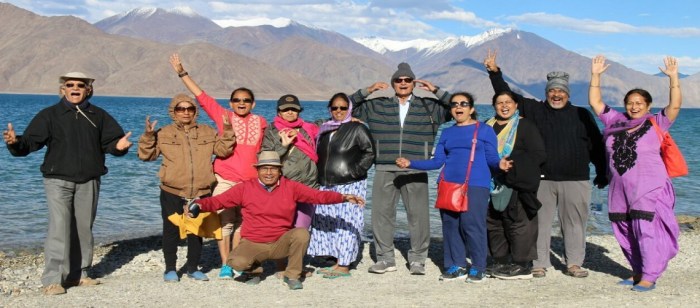Small Group Travel For Seniors offers a compelling alternative to mass tourism, catering to the unique needs and desires of older adventurers. This approach prioritizes personalized experiences, fostering deeper connections with fellow travelers and destinations alike. Forget the hurried pace of large group tours; small group travel allows for a more relaxed and enriching journey, tailored to the physical capabilities and interests of each participant.
This guide delves into the benefits, planning considerations, and practical aspects of ensuring a safe and memorable trip for senior travelers.
From carefully curated itineraries emphasizing accessibility to expert advice on choosing the right tour operator and managing potential health concerns, we’ll explore the myriad advantages of small group travel for seniors. We’ll examine diverse tour types, from culturally immersive explorations to gentler nature-focused adventures, and offer practical guidance on budgeting, accommodation, and pre-trip preparation. Ultimately, this guide aims to empower seniors to embark on fulfilling and enriching travel experiences with confidence and ease.
Types of Small Group Tours for Seniors: Small Group Travel For Seniors

Small group travel offers seniors a unique blend of personalized attention and the camaraderie of shared experiences. The intimate setting fosters deeper engagement with destinations and fellow travelers, creating memorable journeys tailored to specific interests and physical capabilities. This section explores various tour types and logistical considerations to help seniors plan their ideal adventure.
Cultural Immersion Tours
These tours focus on exploring the history, art, and traditions of a specific region or country. Examples include guided walking tours of historic cities like Rome or Florence, visits to renowned museums and art galleries, and participation in local cultural events such as cooking classes or traditional music performances. The emphasis is on learning and experiencing the destination’s unique cultural heritage.
Tours often include expert-led lectures and discussions, enriching the overall experience.
Adventure Tours for Active Seniors
Contrary to popular belief, adventure travel isn’t limited to younger demographics. Many active seniors enjoy moderate adventure tours that combine physical activity with cultural exploration. These might include hiking excursions in national parks, gentle kayaking trips on calm waterways, or cycling tours through scenic countryside. The key is to choose tours with appropriate levels of physical exertion and well-defined safety protocols.
For instance, a tour in the Swiss Alps could involve scenic train journeys combined with shorter, less strenuous hikes.
Cruises for Seniors
Cruises offer a convenient and comfortable mode of transportation, allowing seniors to visit multiple destinations without the hassle of packing and unpacking repeatedly. River cruises, particularly, are popular choices for seniors due to their calmer waters and smaller ship sizes, providing a more intimate and manageable experience. Ocean cruises, while offering broader itineraries, may present more challenges for those with mobility issues due to larger vessels and longer travel days.
However, many cruise lines offer accessible cabins and facilities, catering to the needs of senior travelers.
Transportation Methods: Buses, Trains, and Private Cars
The choice of transportation significantly impacts the overall tour experience. Buses offer cost-effectiveness and accessibility to a wider range of locations. However, extended bus journeys can be tiring for some seniors. Trains provide a more comfortable and scenic mode of transport, but may not be as geographically flexible as buses. Private cars offer personalized service and flexibility, allowing for customized itineraries and stops, but are generally more expensive.
For example, a tour of Tuscany could effectively utilize a combination of train travel between major cities and private car transfers for exploring smaller towns and vineyards. A well-designed tour would consider the trade-offs between cost, comfort, and accessibility when choosing transportation.
Sample Small Group Tour Itinerary: A Week in Portugal, Small Group Travel For Seniors
This itinerary prioritizes accessibility and caters to moderate activity levels.
Day 1: Arrival in Lisbon & Alfama District Exploration
Arrival at Lisbon Airport, transfer to a centrally located hotel with accessible rooms. Afternoon: Guided walking tour of the Alfama district, Lisbon’s oldest neighborhood, focusing on easily accessible streets and points of interest. Evening: Fado music performance in a traditional restaurant.
Day 2: Sintra & Cascais Coastal Drive
Day trip to Sintra, a UNESCO World Heritage site, utilizing accessible transportation options (e.g., a van with wheelchair access). Visit Pena Palace (consider accessibility features beforehand). Afternoon: Scenic coastal drive to Cascais, with opportunities for leisurely walks along the promenade.
Day 3: Óbidos & Wine Tasting
Visit the charming medieval town of Óbidos, accessible by car or accessible bus. Explore the town walls and enjoy local pastries. Afternoon: Wine tasting at a nearby vineyard, ensuring accessibility to the tasting room and facilities.
Day 4: Relaxation and Optional Activities
Free day for relaxation or optional activities, such as a cooking class, a visit to a local market, or a museum visit. Transportation arrangements can be tailored to individual preferences and mobility needs.
Day 5: Évora & Roman Ruins
Day trip to Évora, another UNESCO World Heritage site, accessible by car or accessible bus. Explore the Roman Temple and the Chapel of Bones. Afternoon: Free time for souvenir shopping or exploring the town at your own pace.
Day 6: Lisbon City Exploration & Farewell Dinner
Explore Lisbon’s highlights, such as Jerónimos Monastery and Belém Tower, using accessible transportation options. Evening: Farewell dinner with traditional Portuguese cuisine in a restaurant with accessible facilities.
Day 7: Departure
Transfer to Lisbon Airport for departure.
Embarking on a small group senior travel adventure promises a rewarding blend of exploration, camaraderie, and personalized attention. By carefully considering the factors Artikeld in this guide—from pre-trip health assessments to choosing accessible accommodations and reputable tour operators—seniors can confidently plan and enjoy enriching travel experiences tailored to their needs and preferences. The benefits extend beyond simply sightseeing; small group travel fosters meaningful connections, creates lasting memories, and empowers seniors to continue exploring the world on their own terms, maximizing both adventure and well-being.

